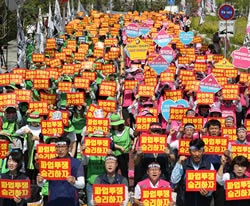SOUTH KOREA
 As contracted public employees wound up a three-day national walkout, South Koreans have been rocked by the announcement of an unprecedented strike by postal workers.
As contracted public employees wound up a three-day national walkout, South Koreans have been rocked by the announcement of an unprecedented strike by postal workers.
The Korean Confederation of Trade Unions (KCTU), a militant umbrella labour group, called the initial strike in a bid for wages rise for contractors, who are called non-regular workers in Korea.
Contract workers at public elementary and secondary schools nationwide, including cafeteria cooks and after-school daycare service assistants, accounted for the bulk of the strike participants.
Other public sector non-regulars, including highway toll collectors and cleaners for Local Governments, also participated.
The Ministry of Education said the number of contract school workers who participated in the three-day strike reached 52,000, the largest on record.
A similar strike staged for two days in 2017 drew a total of 35,000 non-regular school workers.
A group of 200 highway toll collectors occupied tollgates on the Gyeongbu Expressway in Seongnam, south of Seoul, blocking traffic for two hours.
Police detained 23 of them on charges of impeding traffic.
The KCTU, with nearly one million members, has been intensifying pressure on the Government to implement its election pledge to narrow the gap between regular and non-regular workers and switch all non-regular workers in the public sector to regular status.
The group, unhappy with the slowing pace of status switches for non-regular employees, has called for another general strike on 18 July.
Meanwhile, postal workers said they planned to go on a strike after the failure of their negotiations with the management of state-run Korea Post on improving their working conditions and increasing new hires.
Their union has called for enforcing a five-day work-week, suspending mail delivery on Saturdays and immediately recruiting 2,000 new postal workers to address the problem of staff shortages and delivery workers’ deaths from overwork.
There has never been a strike by postal workers in the 135-year history of Korea Post.
Seoul, 6 July 2019











